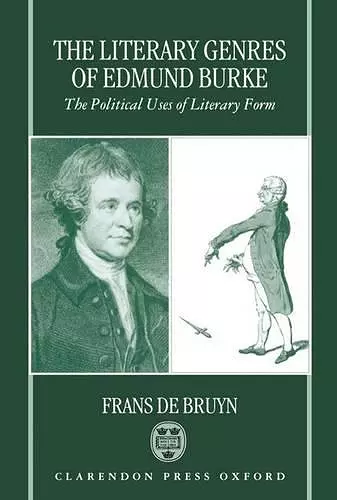The Literary Genres of Edmund Burke
The Political Uses of Literary Form
Format:Hardback
Publisher:Oxford University Press
Published:31st Oct '96
Currently unavailable, and unfortunately no date known when it will be back

Named as an Outstanding Academic Book of 1997 by CHOICE
This title aims to bring a literary perspective to bear upon Edmund Burke's political writings. The author demonstrates how thoroughly Burke relied on the dominant literary discourses of his time, especially the satire and georgic/didactic modes, in composing his speeches and polemics.The Literary Genres of Edmund Burke brings a literary perspective to bear upon Edmund Burke's political writings. Burke understood himself to be a `literary' writer, a claim that held a much greater cultural and political significance in his time than it does in our own. This study recontextualizes Burke's writings by exploring what the eighteenth century understood by the term `literature' and by demonstrating how thoroughly he relies on the dominant literary discourses of his time, especially the satire and georgic/didactic modes, in composing his speeches and polemics. From his debt to the Scriblerian satire of Pope and swift to his extensive use of the theatrical metaphor and his forays into the fields of gothic romance, tragedy, and epic, De Bruyn argues that the literary forms Burke uses are instrinsic and indispensable elements in the meanings of his texts, both for himself and for his audience.
Perhaps the fittest compliment one can offer De Bruyn's fine book is to describe it as Burkean, for De Bruyn lays before his readers a splendid prospect of Burke's arts of literary-political husbandry. The book works within a well-established tradition of literary scholarship ... the book renews Burke's work by making it more accessible to literary scholars and to teachers of survey courses tracing the curious genealogy of Augustan satire, from say, Pope to Byron. * Mark Blackwell, Modern Philology Aug 99, Vol 97 no 1 *
The book is well and clearly written, with a generous bibliography that balances traditional scholarship and recent theory. It can be recommended to colleagues, who will learn from it, and to students, who will be able to read it./Richard Bevis/English Studies in Canada Vol 24 June 1998
Dr Bruyn illuminates several of Burke's later writings by placing them in a highly sophisticated and theoretically enhanced Augustan literary and cultural context;/William Levine/Eighteenth-Century Studies Vol 31 No 4 (1998)
Among the many virtues of this fine, clearly-written book is its variety. De Bruyn has new light to throw on Burke's Miltonic and biblical sublime ... Much of the excellence of The Literary Genres of Edmund Burke comes from the author's refusal to oversimplify. He is alert to Burke's own contradictions and complexities and never forces texts into a single generic framework ... He succeeds not just in presenting a more historicized Burke to literary critics, but also in offering a more subtly, and self-consciously, literary one to historians ... If Romanticism starts with Burke and Burke's reaction to the French Revolution, De Bruyn shows us that we can comprehend neither without the thorough understanding of eighteenth-century contexts that this book will help us to achieve. * Tim Fulford, Nottingham Trent University, Romantic Circles, Dec 1998 *
- Winner of Named as an Outstanding Academic Book of 1997 by CHOICE.
ISBN: 9780198121824
Dimensions: 224mm x 144mm x 23mm
Weight: 504g
330 pages